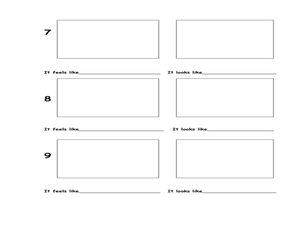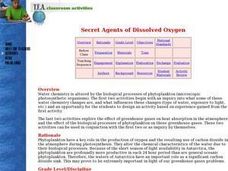Curated OER
Energy Flow in Ecosystems
Learners, in groups, create a slide show about the ecosystem and answer critical thinking questions based on their research.
Curated OER
Duck
In this ducks worksheet, students read information paragraphs about the habitat, reproduction, feeding and adaptation of ducks. Students study the photograph of the bird. There are no questions to answer here.
Curated OER
Bodies of Water
For this writing descriptive sentences worksheet, students describe 13 different bodies of water using the words small, large, fresh, salt, deep, shallow, protected, still, and flowing. Students should include 2 adjectives per sentence.
Curated OER
Human Impact on the Environment
In this environmental science worksheet, students complete a crossword puzzle with 26 questions about human impact on the environment.
Curated OER
Aquatic Communities
Students watch a video about aquatic communities. They conduct an experiment that shows how movement of rivers change the landscape. They compare fresh and salt water communities and its wildlife.
Curated OER
What is an Estuary?
Students define the terms estuary and watershed. They conduct an experiment to determine the density differences between fresh and saltwater. They examine the salinity distribution of the Peconic Bay Estuary.
Curated OER
Sink or Float?
Learners predict and explore to discover which objects sink or float in fresh and salt water, predict how salt affect objects, write predictions on T chart, discuss difference between man-made and natural waters, and graph results.
Curated OER
Exploring Marine Objects
Students identify the sources of water on Earth. In this life science lesson, students list the different plants and animals that live in the ocean. They explore marine objects in the lab and draw them.
Curated OER
Does a change in pH affect the growth and survival rate of aquatic plants?
Students determine if changes in pH affect the growth and survival rates of aquatic plants. They evaluate the optimal pH levels for the growth of aquatic plants.
Curated OER
Using A Winogradsky Column to Analyze Microbial Communities
Students use easily obtained materials to study ecological succession in a microbiological community. They collect water samples from outdoor sources in plastic bottles to observe and record changes.
Curated OER
Relating Number of Insect Species to Water Quality
Students are asked to respond to questions such as:" Have there been surveys of the area to inventory the species?" (For example, for a wetland area, do they know what amphibians live there and how abundant they are?) Are there any...
Curated OER
Great River Bend Adventure
Students use their imagination. They discuss the 4 C's of teamwork: Concentration, Communications, Coomperation, and Consideration. Students discuss the safety guidelines of the project. They complete a rope maze. The group walks...
Curated OER
The Effect of Automobile Exhaust on Hydra in an Environmental Chamber
Students study the structure and habitat of the hydra in this lab lesson. Students determine if the hydra can be used as an indicator to detect pollution from automobile exhaust.
Curated OER
Making a Food Web and Learning About Ecosystems
Third graders examine the difference between a food web and food chain. They also examine the importance of the sun in a food web and food chain. Students understand what happens when you remove parts of the chain.
Curated OER
Missing Macroinvertebrates
Students investigate the concept of a macroinvertebrate. They observe the presence of increases or decreases in population in order to test for factors that contribute to the extinction of a species. Students predict the likelihood of...
Curated OER
Secret Agents of Dissolved Oxygen
Young scholars determine the changes in different types of water in a sealed container over time. They investigate how to measure dissolved oxygen, temperature, and carbon dioxide with calculator or computer probe-ware. Students...
Curated OER
Water World
Learners explore the various steps of the water cycle. They identify the three steps in the water cycle and how they are related. Students describe three ways to conserve water. Learners explore the origin of the water source that...
Curated OER
Precious Water: Is it a Need, a Right, or a Commodity?
Students determine whether water is a need, a right, or a commodity. In this water lesson, students investigate land and water ecosystems through activities. Students also discover water as a resource and energy source as they observe...
Curated OER
Introduction to Simulation Project
Students create a simulated self-sustaining ecosystem. In this biology lesson, students examine the different food chain and ecosystems in their model. They recommend some improvements and changes to an existing ecosystem.




















